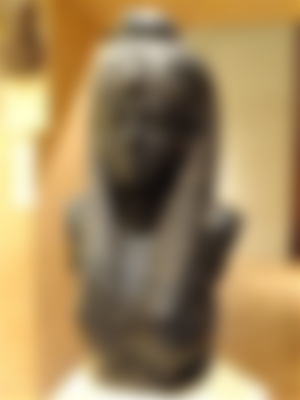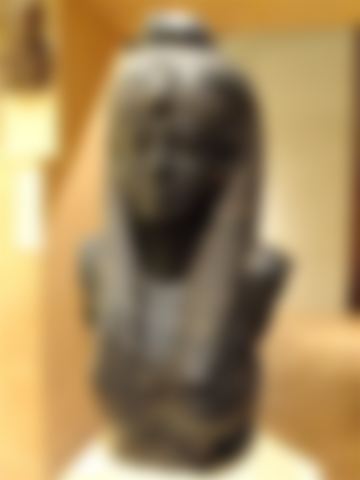Cleopatra VII Philopator
Technically, the last Pharaoh of Egypt and last ruler of the Ptolemaic dynasty was Ptolemy Caesarion. But he was a mere child, in practice the last ruler of Pharaonic Egypt was his mother, Cleopatra VII Philopator, commonly known only as Cleopatra [Greek: Κλεοπάτρα]. She first co-reigned with her father, Ptolemy XII, after his death with her brother (and husband) Ptolemy XIII, and after him with another brother (and husband) Ptolemy XIV, finally to make her son with Julius Caesar, Caesarion, her co-ruler. A woman could not reign alone.
Cleopatra's life was dramatic, but history has been embellished by myth and legend through the centuries - a process she deliberately (and very skilfully) started herself - so the real Cleopatra is hard to discern. In fact, she is probably the best-known Egyptian ever. Or, more correctly, Cleopatra of myth is the best-known Egyptian ever. The real woman to a large extent escapes us.

Cleopatra was born in Alexandria in 69 BC and died – also in Alexandria – in the year 30 BC. During her relatively short life, she came to be deeply involved in Roman politics and use Roman politics to further her ambitions in Egypt and within the Ptolemaic dynasty. She had a relationship with Julius Caesar, and they had a son, Caesarion (formally the last Pharaoh); and she later had a relationship and three children with Mark Antony. They married according to Egyptian rite (Mark Antony also had a wife back in Rome), and they – or at least Cleopatra – dreamed about an empire, Rome and Egypt united, she and Mark Antony would rule. All that came to an end when Octavian, later the Emperor Augustus, defeated Mark Antony, Cleopatra and all other rivals of power. Rome annexed Egypt. They became united, but not in the way Cleopatra had planned.
Posterity has romanticised the love story of Cleopatra and Mark Antony, but studying facts, it is hard to escape the impression that Cleopatra was merely a cold manipulator who tried to use Roman strongmen for her own purpose.

I have the same impression from her devotion to Egyptian religion, symbols, history... Such as that she claimed to be the daughter of Isis, wanted to connect to the first Ptolemy by crocodile symbols, etc. All this looks like a staged performance, set up by an intelligent but cold woman whose sole interest was power.
The Serpent Of The Nile & Cleopatra's Death
“Serpent of the Nile/Relieve me for a while/And cast me from your spell and let me go”
(Freddie Mercury, Lily of the Valley, 1974)
Freddy Mercury sang about the "Serpent of the Nile", but he did not coin the expression. It's an old phrase. It usually ties with Cleopatra (VII), the last (de facto) Ptolemaic ruler of Egypt.
“Or murmuring "Where's my serpent of old Nile?"/For so he calls me. Now I feed myself/With most delicious poison.”
(Cleopatra in Shakespeare's play "Antony and Cleopatra", Act 1, Scene 5. First Folio 1623.)
It is general belief that Cleopatra was "The Serpent of the Nile". However, there is no clear and verifiable reason why she would have been called that. Just a few speculations. All with a certain plausibility, but not entirely convincing.
Possibly, it comes from the Roman view of snakes being sly, evil and sensual - which would resemble Cleopatra's attempt to use Julius Caesar and Mark Antony for her own political purpose. Undoubtedly, sex was one of her weapons in those cases.
It should be noted that the Egyptian view of snakes was completely different. The cobra was a symbol of royalty and power. But there is no indication that Cleopatra would have been called the "Serpent of the Nile" in Egypt.
Other explanations try to link to the death of Cleopatra, which in many sources is attributed to a snake (suicide or murder), or to the cobra as a symbol of the Pharaoh in Egypt. Sometimes it is explained that Cleopatra liked snakes as pets or that she was worshipped as a snake goddess, (two, as I understand it, historically unverified claims).
Zecharia Stitchin has another suggestion, which has nothing to do with Cleopatra. In his Earth Chronicles, where he presents a hypothesis that human civilization was created by travellers from space, he says that the Nile from above looked like a serpent and that the term originally might refer to the Nile.
Probably we will never know the answer, but in contemporary Western culture, the phrase is considered an epithet of Cleopatra in the extensive myth that has grown around her person and life.
But what about Cleopatra's death?
According to Shakespeare and, before him, Velleius Paterculus (about 19 BC - 31 AD), a bite from an asp would have caused Cleopatra's death. Another tradition holds that it was an Egyptian cobra.
Asps don't exist in Egypt, and their poison does not give the symptoms described in connection with Cleopatra's death - so I think an asp can be ruled out. The snake that killed Cleopatra should have been smuggled into her presence in a basket. A cobra seems too large for this. The question about which species of snake it was must be considered unanswered - and it is likely to remain so. We don't even know if she were indeed killed by a snake.
It is possible that the snake is mere legend and that she died by drinking poison.
It is also unclear whether her death was suicide, as is often said, or if she was murdered on orders of Octavian (later emperor Augustus). However, Octavian would probably have preferred to bring Cleopatra alive to Rome as part of his triumphal march. Cleopatra, already then a legend, would have made a prestigious captive and symbol of the defeated Egypt. For that reason, it would have been in Octavian's interest to keep her alive. Unless, of course, alive she would still be a political threat.

Caesarion, her son, outlived his mother, but was soon killed by the Romans. A son of Julius Caesar and Cleopatra could not only legitimately claim Egypt, he could possibly claim Rome. A danger to any Roman with aspirations of power. Octavian efficiently removed everyone who could threaten his own position.
Read more about Cleopatra and the dynasty to which she belonged in:
"The Ptolemaic Dynasty of Egypt", "The Crocodile, a Symbol of Egypt?" and about "Names in the Ptolemaic Family".
(Lead image shows Cleopatra presenting offerings to Isis. Detail of Limestone Steele. Original in Louvre Museum. Public Domain)
Copyright © 2020 Meleonymica/Mictorrani. All Rights Reserved.
All my articles about Egypt and Egyptology can be found here.
Interested in history, legends and myths, join my community History, Myths, Legends & Mysteries (be45).
You find all my writings on Read.Cash, sorted by topic, here.



thats called history and i loved to see history